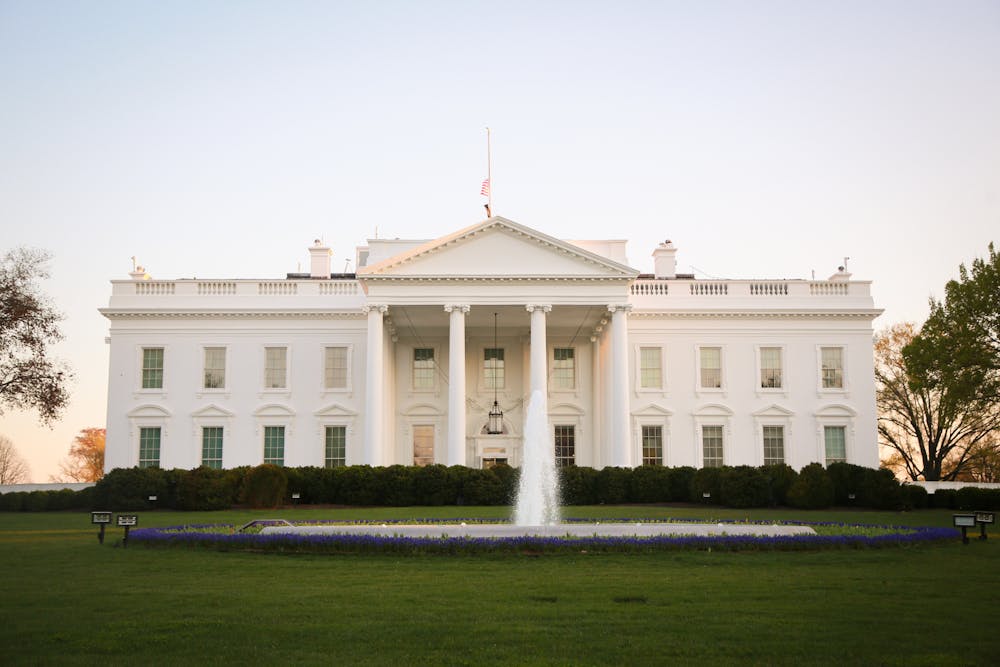
1968 Wharton graduate and President Donald Trump announced a slate of education-related executive orders on Wednesday.
The April 23 orders outlined a series of initiatives aimed at addressing concerns over foreign influence in academic institutions and the quality of education provided by accredited universities. The first executive order focused on requiring universities to disclose foreign funding sources in greater detail, while the second sought to overhaul the accreditation system, criticizing current accreditors for prioritizing diversity, equity, and inclusion-related initiatives over ensuring institutional quality.
The first order, titled “Transparency Regarding Foreign Influence at American Universities,” claimed that Section 117 of the Higher Education Act of 1965 — which has required universities to report significant sources of foreign funding — has not been sufficiently enforced.
“It is the policy of my Administration to end the secrecy surrounding foreign funds in American educational institutions, protect the marketplace of ideas from propaganda sponsored by foreign governments, and safeguard America’s students and research from foreign exploitation,” the order read.
The Department of Education will implement a stricter process to enforce foreign funding disclosure requirements, including provisions for audits, investigations, and penalties for institutions that fail to comply, according to the order.
Colleges and universities must comply with the new foreign funding disclosure guidelines to be eligible to receive federal funding.
The “Reforming Accreditation to Strengthen Higher Education” order criticized accreditors for approving “low-quality institutions” that offer a “negative return on investment,” citing the national six-year undergraduate graduation rate of 64% in 2020 as evidence. The order also referenced language from the federal accreditors of juris doctor and doctor of medicine programs, highlighting their emphasis on maintaining diversity in the student bodies of higher education institutions.
The order granted Secretary of Education Linda McMahon the power to deny, monitor, suspend, or terminate accreditation recognition for accrediting bodies that violate federal law or practice DEI initiatives.
“Notwithstanding this slide in graduation rates and graduates’ performance in the labor market, the spike in debt obligations in relation to expected earnings, and repayment rates on student loans, accreditors have remained improperly focused on compelling adoption of discriminatory ideology, rather than on student outcomes,” the order read.
Republican lawmakers have long argued that foreign adversaries use financial ties to exert influence over American colleges. Penn has also been on the receiving end of Republican criticism over the Penn Biden Center for Diplomacy and Global Engagement, which lawmakers have referenced in broader concerns about foreign influence in academia.
In March, the United States House of Representatives passed a bill to increase oversight of universities that receive foreign donations and investments. The Defending Education Transparency and Ending Rogue Regimes Engaging in Nefarious Transactions Act furthers Republican-led efforts to reinforce reporting requirements for foreign funding — particularly from entities linked to China and other nations characterized as opposed to U.S. interests — in higher education.
In January 2023, the DP reported that a letter sent by the House Oversight and Accountability Committee to former Penn President Liz Magill inquired about foreign donations and visitors to the Penn Biden Center after the discovery of classified documents at the Washington think tank.
In a previous statement to the DP, a University spokesperson denied allegations of foreign influence, writing that “the Penn Biden Center has never solicited or received any gifts from any Chinese or other foreign entity."
The Daily Pennsylvanian is an independent, student-run newspaper. Please consider making a donation to support the coverage that shapes the University. Your generosity ensures a future of strong journalism at Penn.
Donate







